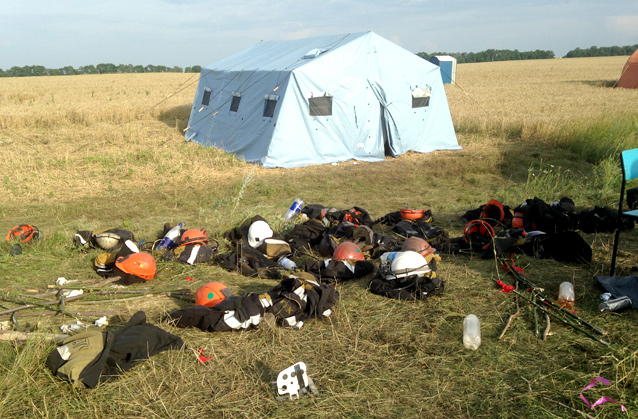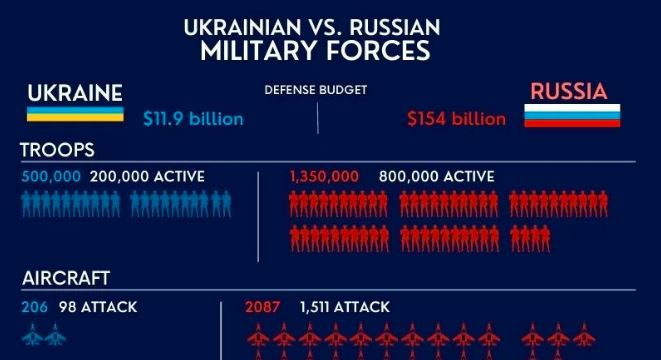How the investigation of the airplane crash is carried out on the territory of Donetsk oblast, where war is underway
The village of Grabovo in Donetsk oblast looks like a postcard: beautiful even fields crowded with firm sunflowers and golden wheat, and beyond the slight mist on the horizon, over the field – strongly expressive graphite spoil tips. It is difficult to believe that war has been going on for three months now on this land. It is difficult to believe that these sunflowers and wheat were the first to witness the deaths of two hundred ninety-eight people that were peacefully flying to do their business in Malaysia.
The road to the Ministry of Emergency Situations tents at the crash site, where the front part of the plane and the majority of the passenger bodies fell, is blocked by a bus guarded by armed people in uniform with a St. George’s ribbon sewn on in the shape of a V. This symbol belongs to the army of the “Defence Minister” of the People’s Republic of Donetsk Igor Strelkov. Press vehicles have lined up in front of the bus: journalists from all over the world came to record the event.
The armed people don’t let the journalists get any further than the bus: according to them, investigation is underway there. In reality I see that regular people without special uniforms and identification are carrying black plastic bags with the remains of the Boeing passengers off the field. The majority of them are neither police workers nor Ministry of Emergency Situations specialists.

An hour before I came to the crash site, the “Prime Minister” of the PRD Alexandr Boroday held a briefing, at which he literally shouted that the representatives of the “republic” are not taking the bodies, personal belongings and pieces of the plane off the field in order to wait for the international committee to arrive for the investigation of the catastrophe.
“You see, the bodies have been lying in the heat for three days, and Kyiv is being slow!” Boroday repeated about a dozen times.
I am trying to understand who the people walking around the field with black bags are. One of my interlocutors, a guy with a gun, sat down in a lotus pose in the middle of the road and lit up a cigarette tiredly.
“They are volunteers,” he answers reluctantly. “They are taking away bodies and scraps.”
“How so?” I am confused. “Boroday said that nobody is to touch anything here before the committee comes…”
“How should I know, you see everything for yourself. I told you, they are volunteers,” the gunman says nervously, stands up and yells to his comrades: “Listen, I’m tired, explain it to her, eh?!”

A skinny boy with a black net over his face approaches me and starts to curtly explain what I already heard:
“They are Ministry of Emergency Situations, criminalists…”
“But your Prime Minister siad that the scene will remain untouched,” I try to get an answer again. The boy shrugs.
Our conversation is interrupted by the head of the guard – a stout bearded man in a uniform and with a belt of shells. He is clearly weary of the attention of the press.
“Citizens, retreat behind the bus, don’t make me moody,” he says with a scowl and adds ambiguously. “Otherwise you will find out why they call me Moody.”
The journalists are not in haste to disperse, as per custom, hoping to go further after all. I retreat, as I already know from my own experience that if one starts shooting into the air, someone may get caught by the ricochet.
Suddenly Moody takes the machine gun off his shoulder and raises it into the air.
“Go back, or I will start speaking in the Kalashnikov language!” He shouts. The journalists trot back.

A colleague whispers to me that had OSCE representatives been here – and they left about twenty minutes before we came, – the PRD’s would not have allowed themselves to act this way. Later the OSCE leadership claimed that the specialists were not allowed to examine the entire territory of the crash site, and only a small lot was opened, the one with the biggest amount of plane parts and bodies.
Not far from this place is a wheat field. A group of people in orange helmets with lights are walking through it, each of them has a stick in his hand with a piece of red cloth tied to it. They are local miners. They stop on the edge of the field and throw the items they discovered into a heap: a twisted black suitcase, a sneaker, a jacket…
“We are looking for bodies, things, pieces of the plane,” explains the brigade leader, miner Roma.
“And who asked you to do this?” I ask.
“Our superiors,” says Roma. “They said to gather the things and bodies and give it to those, from the PRD.”
The miners do their job calmly, as if this is not the first time they’ve come face-to-face with such a thing. They answer the question as to how they regarded the catastrophe that happened on their land without emotion, even somehow evenly in a mundane way.
Some time later the same miners hauled the horrifying black bags one by one onto a truck. The same way they gathered the items from the field: calmly, mundanely.

In the village of Rassypnoe several of the bodies from the Boeing fell directly onto the houses. One of them went through the roof of a small house – a summer kitchen. The owner was at home at the time and came to check out the noise.
I look at the hole in the ceiling and imagine how it happened with horror. A person flew down from an altitude of ten thousand kilometres, someone who was sitting in a violet airplane seat five minutes before, going to Malaysia for some reason…
“They took him away from here yesterday, he spent a day lying here,” says the owner of the house. “A young guy with a wound covering half his face.” He says this without any tragedy in his voice and even smiles. I presume it is because of shock.
A woman from the house across from his says that on that terrible day she was preparing canned food, and when she heard the buzz of the airplane, she got scared and ran to the basement. Then, she says, as everyone else in the village, she went to the field to see the bodies.

The steel sunflowers, golden wheat, graphite spoil tips, calm miners, curious villagers, nervous People’s Republic of Donetsk mercenaries… This strange world that emerged within the last few months in the east of Ukraine unexpectedly joined its fate with that of two hundred ninety-eight people. Among the citizens of Holland, Germany, France, Belgium, the UK, Australia, Canada, Indonesia and Malaysia that ended up on the flight by tragic accident, it is unlikely that many knew that not far from the eastern border with Russia there is Donbas, and its territory has bee the stage for the fight for Ukrainian integrity for four months now, that someone invented the People’s Republic of Donetsk here and hundreds of people took up arms for this republic.
It is unlikely that anyone will be able to explain this comprehensively to the friends and families of the deceased. But someday we will get an answer. And the golden Ukrainian fields that accepted the accidental witnesses of the war will guard their final breaths.
Source: snob.ru
Translated by Mariya Shcherbinina





